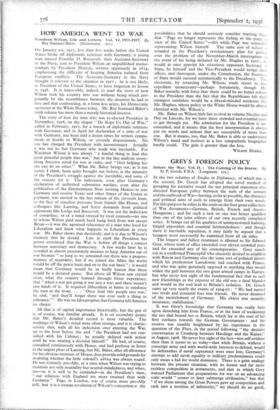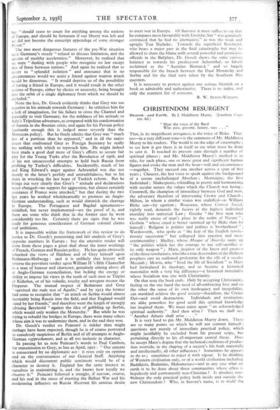Before the War. Vol. II. : The Coming of the
Storm. By G. P. Gooch, F.B.A. (Longmans. los.)
GREY'S FOREIGN POLICY
IN the two volumes of Studies in Diplomacy, of which this is the second, Dr. Gooch has adopted the novel method of grouping his narrative round the ten principal statesmen who directed European policy between the turn of the century and the outbreak of War—leaving, so faras possible, the character and political aims of each to emerge from their own words. For this purpose he relies in the main on the four great collections of War documents—German, British, French and Austro- Hungarian ; and for such a task no one was better qualified than one of the joint editors of our own recently completed series. It brings out all his qualities of unimpassioned learning, limpid exposition and essential fairmindedness : and though there is inevitable repetition, it may fairly be argued that a hexagon must necessarily be examined from all six sides.
The longest and fullest treatment is allotted to Sir Edward Grey, whose term of office extended over eleven crowded years and far exceeded any of his contemporaries. Grey stands out as a confirmed Francophil who sincerely desired to establish with Russia and Germany also the same sort of political detente which his predecessor Lansdowne had reached with France, and who was quite genuinely opposed to anything that would widen the gulf between the two great armed camps in Europe, but who never lost sight of the fundamental fact that to seek new friendships at the expense of the old was a fatal blunder and would in the end lead to Britain's isolation. Dr. Gooch sums up very neatly the events of 1904-07 : " We had turned two rivals and potential foes into friends. He never dreamed of the encirclement of Germany. His object was security, insurance, stabilisation."
It was Grey's knowledge that Germany was really bent upon detaching him from France, or at the least of weakening the ties that bound her to Britain, which lay at the root of his first coolness towards the German Government : and his reserve was steadily heightened by his experience in the question of the Fleet, in the period following " the decisive conversation at Cronberg between Hardinge and the Kaiser," in August, 5908. He never lost sight of the fact—less self-evident then than it seems to us today—that while Britain, without a conscript army and with world-wide interests to defend, would be defenceless if naval supremacy were once lost, Germany's attempt to add naval equality to military predominance could only mean a bid for world dominion. There is a grim analogy between the present situation, with its insane and far more reckless competition in armaments, and that in which Grey warned Parliament that preparations for war on an advancing scale would " sooner or later submerge civilisation," but that " if we alone among the Great Powers gave up competition and sank into a position of inferiority," we should do no good, but " should cease to count for anything among the nations of Europe, and should be fortunate if our liberty was left and we did not become the conscript appendage of some stronger Power."
The two most dangerous features of the pre-War situation were Germany's steady " refusal to discuss limitation, and the spectre of stealthy acceleration." Moreover, he realised that we were " dealing with people who recognise no law except that of force between nations." And again he realised that to revert to " splendid isolation " and announce that in no circumstances would we assist a friend against wanton attack would be disastrous. " It would deprive us of the possibility of having a friend in Europe, and it would result in the other nations of Europe, either by choice or necessity, being brought into the orbit of a single diplomacy from which we should be excluded."
None the less, Dr. Gooch evidently thinks that Grey was too negative in his attitude towards Germany : he criticises him for a lack of imagination, for his failure to cross the Channel and especially to visit Germany, for the mildness of his attitude to Italy's Tripolitan adventure, as compared with his condemnation of Austria in the Bosnian crisis, and again for his Persian policy (curiously enough this is judged more severely than the Moroccan policy). But he freely admits that Grey was " much less of a partisan than he appeared," and in all the major issues that confronted Grey as Foreign Secretary he really has nothing with which to reproach him. He might indeed have made a good deal more of Grey's efforts to secure fair play for the Young Turks after the Revolution of 1908, and of his not unsuccessful attempts to hold back Russia from profiting by Turkey's difficulties. Incidentally, much of his and King Edward's anger against Aehrenthal was due not merely to the latter's perfidy and untruthfulness, but to his share in wrecking the last hope of Turkish reform. But he brings out very clearly that Grey's " attitude and declarations never changed—no support for aggression, but almost certainly assistance if France were attacked," but that during the two last years he worked wholeheartedly to promote an Anglo- German understanding, such as would diminish the cleavage in Europe. The Portuguese and Bagdad agreements— initialled, but never implemented—are the proof of it, and there are some who think that in the former case he went considerably too far. Certainly there are signs that he was ready for generous consideration of German colonial claims and ambitions.
It is impossible within the framework of this review to do justice to Dr. Gooch's penetrating and fair analysis of Grey's opposite numbers in Europe ; but the attentive reader will learn from these pages a great deal about the inner workings of French, German and Russian policy. He has quite obviously inherited the views of Haldane and of Grey himself upon Bethmann-Hollwegg : and it is unlikely that history will reverse the prevalent verdict upon William II 's fifth Chancellor as a man of honour and character, genuinely aiming above all at Anglo-German reconciliation, but lacking the energy or ability to impose his views in the teeth of such men as Tirpitz or Kiderlen, or of his volatile, touchy and arrogant master the Emperor. The mutual respect of Bethmann and Grey " survived the rude test of Agadir," and by 1913 the former had collie to recognise that " an attack on Serbia would almost inevitably bring Russia into the field, and that England would stand by her friends," and therefore went the length of strongly advising Berchtold " against the idea of gobbling up Serbia, which would only weaken the Monarchy." But while he was trying to rebuild the bridges in Europe, there were many others whose aim it was to undermine them, and in the end they won.
Dr. Gooch's verdict on Poincare is milder than might perhaps have been expected, though he is of course portrayed as ceaselessly suspicious of Berlin and of all attempts at Anglo- German rapprochement, and as all too inelastic in character.
In passing let us note Poincare's words to Paul Cambon, for transmission to Grey, as late as April, 1912 : " Our entente is consecrated by no diplomatic act : it rests only on opinion and on the conversations of our General Staff. Anything which would discontent public sentiment would be of a character to destroy it. England has the same interest as ourselves in maintaining it, and she knows how loyally we observe it." Poineare followed a straight, if narrow, course, and his zeal in the cause of averting the Balkan War and his
moderating influence on• Russia illustrate his anxious desire • to avert war in Europe. Of Sazonov it must suffice to say that he compares most favourably with Izvolsky, but " was genuinely convinced that he had no alternative," as was the weak and upright Tsar Nicholas. Towards the superficial Berchtold, who bears a major part in the final catastrophe but may be allowed to share the blame with several powerful and pernicious officials in the Ballplatz, Dr. Gooch shows the same curious leniency as towards his predecessor Aehrenthal, so falsely acclaimed as the " Austrian Bismarck " and so largely responsible for the breach between the Dual Monarchy and Serbia and for the fatal turn taken by the Southern Slav question.
It is necessary to protest against one serious blemish on a book so admirable and authoritative. There is no index, and only the scantiest list of contents.
R. W. SETON-WATSON.







































 Previous page
Previous page